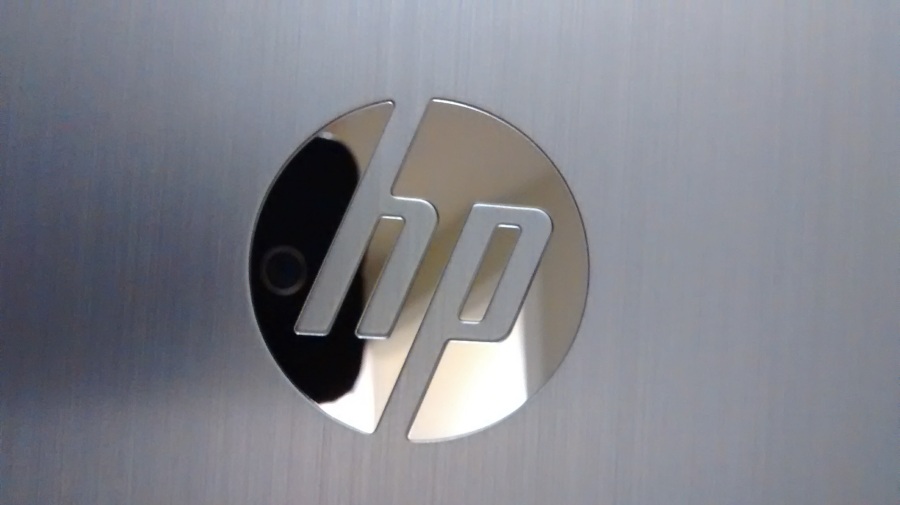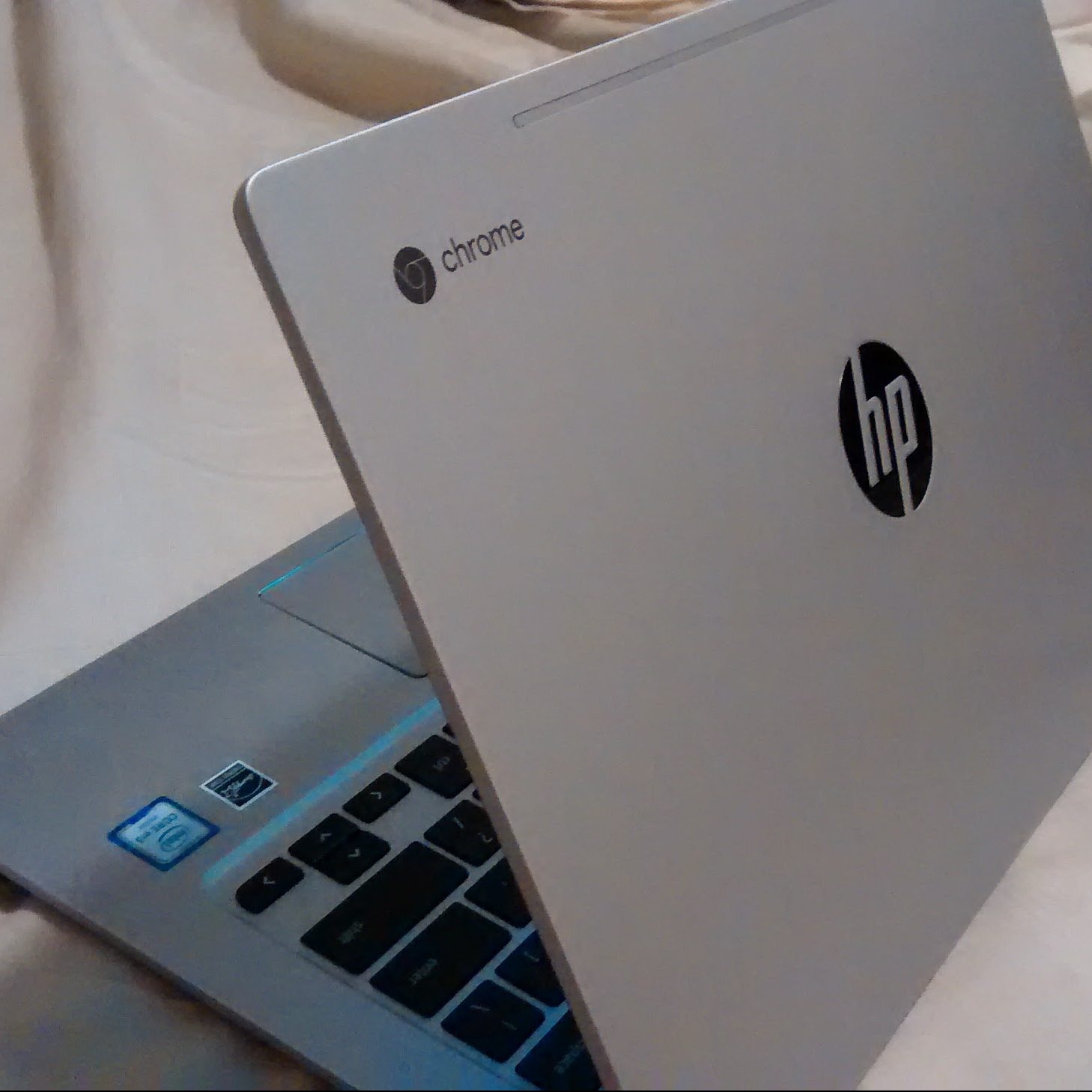I just got a new computer. And I love it.
I primarily wanted something for writing (this blog + other random projects), and for general checking email, browsing the web and the like. I needed something lightweight and portable, something I could pick up on a whim for hours of creation. I went with a Chromebook and am very happy with my decision.
What Are Chromebooks?
Chromebooks are laptops that basically outsource a lot of the computational heavy lifting. For example, my new Chromebook has 32 GB storage, compared to the roughly 500 GB you might expect from a typical laptop these days. This is because most data and applications are web-based, so very little space is needed for a Chromebook.
In fact, you don’t need a lot of other specs that come standard in a regular laptop. RAM and CPU are not as important, meaning you can get fast performance from less. And yes, this means they are cheaper to boot!
Who Uses Chromebooks?
People who primarily use their computer for browsing the web or writing can definitely benefit from Chromebooks, but they can also be powerful collaborative tools. Google Apps For Education (GAFE), unsurprisingly, are tools for educators that are optimized for schools. GAFE schools are full of Chromebooks and happy teachers – or at least one very happy teacher!
Penny from She Picks Up Pennies works in a GAFE school and was kind enough to share with me her experiences. There are a few major features of Chromebooks that seem to work really well in a school environment:
- Super fast boot ups/fast in general. Since Chromebooks are very lean in general, they boot up in seconds. Literally. This means quick transitions from computer time to concentrating on the teacher time, making technology integration almost seamless.
- Web apps mean flexibility. Want to experiment with a new tool? All you have to do is send a URL. No prolonged installation or extra work. Want to pre-record lessons if you’ll be out of town? Yep, also as easy as sending an address to the substitute.
- Easy collaboration and document management. There really is no excuse for not turning in homework anymore (cue evil teacher laugh).
- Updates are quick and painless. Teachers have to worry about, you know, teaching. They should not have to be tech support for two dozen students. I had critical updates on my Chromebook the other day, and they took fifteen seconds, no joke. Compare this to my Windows work computer that can take up to 30 minutes, and you have a clear winner.
- Low costs. School systems are seldom accused of being flush with cash – the low price point is very appealing and makes technology adoption easier.
The Downsides to Chromebooks
Chromebooks have a defined End of Life (EOL), where automatic software updates are no longer guaranteed. My new Chromebook, for example, is already scheduled for May 2021, just under five years from now. This doesn’t mean that my Chromebook will suddenly stop working, but it will most likely slowly run into issues. The most concerning would be potential security issues. You can install Linux on your Chromebook when the time comes, but as Chromebook hardware specs are typically less than “normal” laptops, speed may be an issue.
Low Consistency. There are many manufacturers, and many models – some are simply not very good machines. This school district, for example, has had the opposite experience from Penny’s school. From that article, it sounds like the hardware acquired was just flat out bad, as opposed to issues with Chrome OS.
I miss paint 😦. At least I used to. Then I discovered the magic of Pixlr Express and am a convert. Now I can do fancy “pinnable” images with much less effort. Like any transition between platforms, there will be things you just need to get used to. Going from Windows to Chromebook was not so bad in general, though – it would be way worse going to or from Apple products.

Some classic shortcuts don’t work. Ever since I found out about the miraculous Windows Snap, I’ve used it every day at work without fail. You can do something similar to the “Windows Snap” on Chromebooks, but it’s not the same! What if I don’t want to use the mouse?? So much effort. In Penny’s words, though: ” I have yet to find a problem that I couldn’t just Google an answer to!”
Not able to do as much offline. Pretty self-explanatory and expected, really, but if your laptop design heavily uses the internet, it will be much less useful offline. However, for things like Google Docs and writing, that’s not a big deal. You can select certain documents or files to be available offline, and any changes will be synced the next time the Chromebook connects to the internet.
Formatting and compatibility with Office products can be pretty bad. Now, this is only a problem is you have to go between formats. Say you regularly need to edit Microsoft Word files and return them in a Word format – a Chromebook is likely not for you. If you’re unfamiliar with Google Docs but curious, definitely give them a try first before springing for a Chromebook.
What to Look For in a Chromebook
So between first drafting out this article and actually writing this article, this really fantastic article came out as a buying guide. That’s a great resource if you’re trying to decide what specs matter. There are a couple more decisions/options I’d add to that list, though (beyond basic weight/size considerations):
- USB Type-C Ports
- Android App Support
USB Type-C ports are becoming the new standard, in both data delivery and power cables. In the future, more computers will have them standard, and life just gets a lot easier when there are standard cables for electronics. Not a huge factor, all things considered, but something that should be on your radar.
By the end of this year, a lot more Chromebooks will have native Android app support, meaning the ability to download and run Android apps on your Chromebook. If this is appealing, make sure you check out this list of Chromebooks that will support Android Apps by the end of the year. To get the most out of Android apps, you may want to make sure you get a touchscreen.
One final thing to note: Do not trust manufacturer assessments of battery life. Some are accurate, some are straight up lies. Always look for independent assessments of the particular models you’re interested in buying. I bought mine knowing that the battery life would probably not be all that was promised, and I found the independent assessment to be very similar to my actual experience.
Penny adds this comment: “Battery life is crucial. Right now, the devices we have are Dell. They charge fully in less than hour and the batteries last all day being used in every class. We piloted Asus devices, but the screen was too close to the edge, making it much more fragile. Really, though, the devices are far more durable than I ever imagined.”
This link from Google should stay up-to-date on the latest models for comparison. I’m not going to link to any “best Chromebook model” articles, simply because they’ll change so much, even in a few months. Just search “best Chromebooks” or even “best Chromebooks under $[insert budget],” and you’ll do fine.
Where to Buy/How to get the Best Deal
For the most part, typical electronics buying guidance applies. Shop around, look for deals, and you might get a better price on a model when it’s replacement comes along. Keep in mind, though, the End of Life policy is on the model, not for whatever arbitrary date you choose to buy it. You can still use Chromebooks after their End of Life, you’d just be taking some security risks. And, of course, you can still install Linux on the Chromebook.
If you get an older Chromebook, there are fewer years left in Google’s pre-ordained “useful life.” That is, yes, it may be $50 cheaper, but support will also only last for four years instead of five years.
We were able to get $60 off via an Employee Purchase Program at Fergus’ work – a lot of employers, especially larger ones, have “hidden” benefits like this that you’ll want to check in on.
HP Chromebook 13 G1 ❤
For my search, I prioritized thin and light. I basically wanted a Macbook Air, but for cheaper and without an Apple OS. I wanted it to be as easy as possible to start up my computer and get to work writing. My old laptop was clunky, did not have a solid state drive (read: loud, slow), and ran really hot. It also had a touch screen that bugged out all the time. Ain’t nobody got time for that.
I ended up getting the HP Chromebook 13 G1 as it’s super shiny and I wanted something nice. See, I’ve been burned by technology before. Exhibit A: my old laptop. It was relatively cheap, and I even said no to the extra $$ that stood between me and a solid state hard drive. For about $100 more dollars, which of course is nothing to sneeze at, I would have ended up with a laptop that wouldn’t annoy the living daylights out of me. This Chromebook is probably overkill, but I haven’t regretted it yet!
If you are looking at this model, the two biggest downsides are the speaker quality (just bad – my cheap phone does a better job) and the battery life. I’ve seen okay battery life but nowhere near the 11.5 hours promised – even on the lowest brightness, and even without video streaming. On the highest screen brightness with video streaming? I’d be lucky to get close to 5 hours. I knew going in that this might be the case, and it’s fine for my purposes. It’s okay, Chromebook, I still love you!

Any other experiences with Chromebooks? Any computer-buying tips in general? Let us know in the comments!

Although I don’t have a Chromebook any longer, I did in the past and I loved it. It is designed for exactly what you have in mind…general web browsing, checking email, writing blog posts. Basically, anything that doesn’t require hard-core storage and processing. It’s lightweight. Long battery life. It’s basically an upgraded tablet so it’s more usable like a traditional laptop would be.
I definitely wouldn’t hesitate to get another one if the need should arise.
LikeLike
Glad you agree – thanks for reading! I’ve yet to come across someone who hates them – except with respect to isolated hardware issues on some models.
There are definitely limitations, and research to be done before buying, but all in all great machines. 😀
LikeLike
Thanks for the review! We’ll be in the market for a new computer soon so it helps you start thinking about the options. We will use our computer for fairly simplym simple tasks so we won’t need much. Sounds like the Chromebook would be a good option. Thanks!
LikeLike
Of course! I always go slightly crazy researching big purchases (huge online eyeglasses post coming soon!), so I might as well write some of it down. 🙂
LikeLike
I’m trying to hold on to my (rubbish) laptop for as long as possible, but have considered chromebook might be a good replacement. I find buying technology really boring to be honest, I never want to spend a lot and it seems to take forever to trawl through reviews and specs for the cheaper models out there.
I don’t think I’ve had a laptop last more than 5 years, so the ‘expiration’ date wouldn’t really put me off tbh.
LikeLike
Hmm, I guess I haven’t really had one last more than five years, either. Or, if they’re still working, I tend to replace them after about that long…definitely something to think about!
If you’re thinking of a Chromebook after your laptop dies, just search the latest “Best Budget Chromebook” articles – you can get a basic machine for under $200, and a pretty spiffy one for under $400. There seem to be some general winners each year in terms of best bang for your buck.
In the mean time, “Go laptop, go! Cling on to dear, sweet life!”
LikeLike
I have noticed that the chromebooks are quite a bit cheaper as they don’t have to buy a Microsoft license. I worry that it might not be powerful enough, but maybe it is? All of my music is on Amazon Music now, so I don’t need a big hard drive for music reasons, I like the tip of getting one with full access to the Android store.
Other than music, all of my documents are txt, photos and PDFs. I imagine a Chromebook can handle those just fine.
The biggest concern would probably be RAM. I tend to have a lot of tabs open in my browser…
LikeLike
Thanks for reading and commenting!
For storage, you get 100 GB of Google Drive storage for free for two years with purchase of a Chromebook right now. Rates for more here (https://www.google.com/settings/storage). For any Chromebook, the local storage isn’t meant to be used much anyway. 🙂
I have a bit of a fancy Chromebook, and it’s faster than my work laptop when it comes to browsing and opening a million tabs. I can’t fully comment on the lower-end models (or really any model except the one I have!), but most Best Buys have a few Chromebooks you can play with in the low to mid-range. My suggestion: Go there and open a bunch of tabs to see for yourself when you’re looking for a new machine. 😀
LikeLike
I love my Asus 2-in-1 at home. It’s a little more sophisticated than a Chromebook, but I still live in a Google world. With so many different options available to people for free, I think it’s smart to explore the G Suite options (apps, extensions, etc.) before paying for subscriptions, tools, or software on any device! 🙂
LikeLike
So true, Penny! It definitely makes sense to try out the Google suite of tools before committing to any purchase. In that way, converting to Chromebook usage is much easier than going to/from Windows or Apple products, since you can (at least to some degree) try before you buy in your daily life. I’m kind of a Google fangirl, so it was a no-brainer for me. 🙂
LikeLike
I have definitely been thinking about a Chromebook for my wife. Last year I almost pulled the trigger for one myself when a Dell was on sale for half price right before Black Friday on Slickdeals that I couldn’t resist. It was essentially the same cost as a Chromebook otherwise I’d probably be typing on a Chromebook. Thanks for sharing your perspective.
LikeLike
Gotta love Black Friday deals when you’re on the hunt for something specific – especially when you don’t have to wake up early/stand in line! Dell seems to have decent sales – my brother was telling me about the Dell Outlet Store online being a great place to go hunting for a new or refurbished computer year-round. 🙂
LikeLike
Thanks for the review, I honestly didn’t really know what a chrome book was until reading this. I know the kids use them at school, but I assumed cheap laptops.
Once we quit jobs and work laptops are returned, we’ll be in the market for new laptops or similar. Maybe a chrome book would fit our needs, as we have a main desktop to meet all major computing needs. Could be a good inbetween.
LikeLike
Glad you found it useful. 🙂 Chromebooks are definitely something you should keep in mind, especially as a secondary computing source. We also have a desktop computer – though the only thing I use it for is gaming!
It’s funny, Chromebooks used to be mostly just known for being cheap, but the recently discontinued Pixel retailed for $999 – $1449!! Unsurprisingly, those did not sell well. The more mid-to-high range models that are popping up (like the one I bought for ~$500) are gaining in popularity, though.
LikeLike